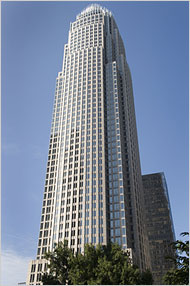To most people, a salary cap of $500,000 would be anything but punishment.

Bank of America is struggling during the financial crisis.
Multimedia
But in Wall Street’s executive suites, it amounts to a humbling pay cut — and, just maybe, the beginning of a cultural shift.
True, the rich always seem to find new ways to get richer. But in the sweep of history, high pay on Wall Street comes and goes through cycles of excess and correction. After an age of astonishing wealth, the cycle, experts say, seems to be turning once again.
The Obama administration’s curb on executive pay, announced on Wednesday, is a limited step. But government actions tend to work best when they are in step with market forces and public opinion. Wall Street’s wayward bonus system, analysts note, is now widely criticized, even in banking circles, for contributing to the economy’s woes.
Understandably, pay is a touchy subject for financial executives these days, with reports last week that total bonus payments at New York financial companies last year reached $18.4 billion.
But with tighter regulations on risk-taking and greater public scrutiny, the pay for top bankers could fall into line with pay for other professions, like doctors and lawyers.
Indeed, high pay on Wall Street is an episodic phenomenon. A recent paper by two economists studied pay in finance from 1909 to 2006, comparing the industry’s pay levels with the private sector as a whole, seeking to adjust for education, skills, age and gender of the workers.
In their National Bureau of Economic Research working paper, Thomas Philippon of New York University and Ariell Reshef of the University of Virginia found that the difference in pay between finance and the rest of industry was slight, if any, except in the late 1920s to 1930 and then again from the mid-1990s to 2006. In those boom years, compensation in finance was 30 percent to 50 percent higher than in the rest of industry.
The Wall Street pay differential with the rest of the economy, Mr. Philippon said on Wednesday, is falling and destined to erode further. “It will go back to something more normal,” he said. “The only reasonable number is zero or very close to zero.”
In executive pay, Wall Street set the tone for other industries, as the compensation of senior managers rose far faster than for most workers. In 2007, the total compensation of chief executives in large American corporations was 275 times that of the salary of the average worker, estimates the Economic Policy Institute in Washington. In the late 1970s, chief executive pay was 35 times that of the average American worker.
“Wall Street led the way, and that’s going to be reversed,” said Lawrence Mishel, an economist at the liberal research group. “We’re going to see a decline in inequality.”
There may well be a slippage in the appeal of Wall Street careers as the pay differential with other professions declines. Over the years, for example, there was a big increase in the percentage of graduates of Harvard who went into finance. Two Harvard economists, Lawrence F. Katz and Claudia Goldin, studied the career choices of undergraduates since the 1960s, finding that the share entering banking and finance rose from less than 4 percent to 23 percent or so in recent years.
Surveying graduates from the 1960s through the 1990s, they found that Harvard graduates who chose careers in finance made three times the pay of their peers, adjusting for grade-point averages and test scores.
“We see a huge shift into finance over the years, and Harvard students clearly respond to economic incentives,” Mr. Katz said. “I certainly don’t think it was a pure love of finance that drove people into the field.”
In recent years, according to Harvard surveys, about 40 percent of students pursued the most lucrative business fields like finance and consulting. If the money were not a consideration, many said they would pursue other paths. In her commencement speech to seniors last year, Harvard’s president, Drew G. Faust, urged students to pursue a career path that stirred them.
“If you don’t try to do what you love — whether it is painting or biology or finance — if you don’t pursue what you think will be most meaningful, you will regret it,” Ms. Faust said.
Markets and regulation will bring total Wall Street compensation down toward other professions, because banks will not be able to load up on debt to magnify the size of the risky bets they make. As a result, analysts note, the potential for outsize profits and paydays will subside, even when financial markets recover.
Still, while perhaps not as lucrative as in the past, Wall Street will surely be a financially rewarding profession for the most skilled.
“The people who are close to the best in finance are going to make a whole lot more money than others,” said Robert E. Hall, a professor of economics at Stanford. “It’s true in professional sports, it’s true for university professors and it’s certainly going to continue to be on Wall Street.”












